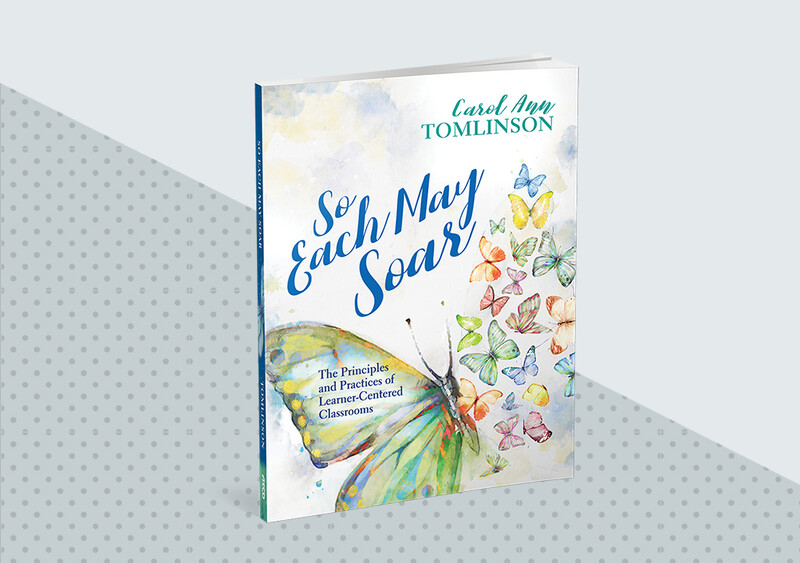“One of the greatest opportunities that we have as teachers is to challenge ourselves to become the best human beings we can be,” says ASCD author and University of Virginia education professor Carol Ann Tomlinson.
That inspiring back-to-school message comes from Tomlinson’s 2021 webinar, “What Matters Most as a New School Year Begins?” which distills lessons from Tomlinson’s book, So Each May Soar: The Principles and Practices of Learner-Centered Classrooms. Though it was produced a year ago, Tomlinson’s webinar offers timeless advice for building relationships with students and centering the human element in teaching.
As schools continue to recover from the stresses of the pandemic, cultivating a sense of belonging will be key. Research has shown that positive teacher-student relationships can lead to more challenging instruction and better academic outcomes.
How Will You Get to Know Your Students?
In the webinar’s opening, Tomlinson describes the importance of seeing, knowing, and responding to the learners we teach. Teachers enter the profession wanting to make a difference for kids, she notes, but relationship-building can seem incredibly overwhelming in today’s schools. Many middle and high school teachers, for example, can have up to 150 students a day.
Still, each and every student will take away something from your time together, says Tomlinson. She offers the following questions to help shape your approach to getting to know students this year (watch the webinar for the complete list):
- What percentage of time would you say you spend thinking about, planning for, and talking with “the class” compared to thinking about, planning for, and talking with students as individuals?
- How do you keep negative comments from colleagues or stereotypes that exist in and beyond the school from shaping your sense of who a student is and might become?
- How do you try to ensure that each student leaves your room every day feeling as though the two of you shared a connection?
- How do you speak to students when they are being “fingernails on your blackboard” or someone else’s? Why?
- How do you invest in getting to know your students better by the day, both in breadth and depth?
- How do you use new information and insights about a student to teach him or her more effectively? In what ways do you enable the student to be your partner in working for his or her growth?
The common theme in these questions is clear: Although content, how we shape instruction, and academic growth are all critical points of reflection, relationships must come first.
How Will You Center Your Humanity?
Relationship-building can be tough, however, if you’re unaware of the way you show up for students. To avoid this, Tomlinson says, teachers can engage in another reflective practice at the start of the school year: Taking an inventory of your own human traits. Where do you stand in the following areas?
- Beliefs about the capacity of every learner to succeed: How firm is your belief in the capacity that every kid in your classroom can make startling progress with the right support?
- Language: How do you address students, talk to them? Does your language lift them up or do something else?
- Patience: How are you doing in terms of patience, when a kid is being a kid [i.e., exhibiting challenging behaviors]? Or that same kid is being a kid for three days in a row?
- Empathy: What do you do to practice empathy?
- Scholarship: How do you continue being a learner in a profession that keeps changing?
- Clarity of thinking: How clear and analytical is your thinking about what you’re doing?
- Trust: How trustworthy are you to the young people you teach?
- Optimism: How do students see your optimism?
- Work ethic: What’s your work ethic?
- Persistence: Are you persistent?
- Flexibility: Are you flexible?
- Creativity: Do you exercise creativity?
- Leadership: What is your capacity to lead kids?
“That’s a book’s worth [of questions], not just a first-day-of-school’s worth,” admits Tomlinson. To get started, you may want to think about one or two areas in which you’re succeeding—and keep growing in them, Tomlinson adds. You might also want to identify an area that needs more attention and dedicate time to increasing your capacity in it.
Reflective thinking can be a powerful tool for teachers’ personal and professional growth, suggests Tomlinson. This school year, as you get to know your students, spend some time getting to “know thyself" as well.
So Each May Soar
Creating learner-centered classrooms can help all students gain a deeper understanding of themselves, others, and the world.









